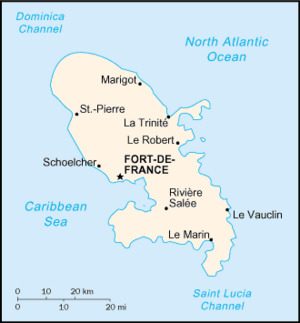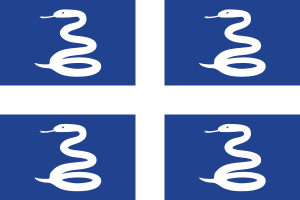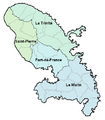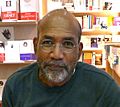Martinique facts for kids
Martinique is a beautiful island located in the sunny Caribbean Sea. It covers an area of about 1,128 square kilometers (436 square miles). Nearly 400,000 people call this island home.
Long ago, the native people of the Caribbean knew Martinique as Madiana or Madinina. In the 17th century, the French arrived and took control of the island. They also brought slavery to Martinique, which was a very unfair system. Even today, France still governs the island, though some people wish for Martinique to become fully independent.
The main city and capital of Martinique is Fort-de-France. Other interesting towns include Sainte-Anne and St. Pierre. St. Pierre was sadly destroyed by a powerful volcano called Mont Pelée in 1902.
Martinique is famous for its lively zouk music. Bands like Kassav' helped make this music popular around the world. A very important thinker and writer named Frantz Fanon, who spoke out against colonialism, was born here. Most people in Martinique have African or mixed African backgrounds. There are also smaller groups of people with European, Native American, Chinese, and East Indian heritage.
Contents
History of Martinique
Early Days and French Arrival
Before Europeans came, the island was home to indigenous peoples like the Arawaks and Caribs. They lived peacefully on the island for many years. In 1635, the French claimed Martinique. They started growing crops like sugar cane, which needed a lot of workers.
Slavery and Its End
To work the plantations, the French brought many enslaved people from Africa. This was a very harsh and unfair time in history. Enslaved people were forced to work without pay and had no freedom. Slavery was finally ended in Martinique in 1848. This was a huge step towards freedom and human rights for everyone on the island.
Volcanic Eruption of Mont Pelée
One of the most dramatic events in Martinique's history happened in 1902. The volcano Mont Pelée erupted with incredible force. It completely destroyed the city of St. Pierre, which was the island's main city at the time. Sadly, almost everyone in St. Pierre lost their lives. This event changed the island forever.
Culture and Music
Martinique has a rich and vibrant culture, blending French and Caribbean influences.
Zouk Music
The island is especially known for its unique music style called zouk. Zouk is a fast, rhythmic type of music that makes you want to dance! It became very popular in the 1980s. Artists like Kassav' helped bring zouk music to a global audience.
Famous People from Martinique
Many talented people have come from Martinique.
- Frantz Fanon was a famous writer and thinker. He wrote important books about how colonialism affected people.
- Aimé Césaire was a well-known poet and politician. He helped create the Négritude movement, which celebrated Black culture and identity.
- Patrick Chamoiseau is a famous novelist who won the prestigious Prix Goncourt for his book Texaco.
- Many athletes also come from Martinique, including footballers like Wendie Renard and gymnasts like Mélanie de Jesus dos Santos.
Geography and Nature
Martinique is a beautiful island with diverse landscapes.
Beaches and Coastline
The island has many stunning beaches with white sand and clear blue waters. Popular spots include Salines Beach and Diamant Beach. The coastline also features dramatic cliffs and hidden coves.
Volcanoes and Rainforests
In the north, you'll find the towering Mont Pelée volcano. The central part of the island is covered in lush rainforests, like the Pitons du Carbet. These areas are great for hiking and exploring nature.
Wildlife
Martinique is home to various animals. You might spot the Jamaican fruit bat flying around. The island's waters are also home to many sea creatures, including sea turtles, which can be seen near beaches like Grand Anse.
Related pages
- Guadeloupe, another French island in the Caribbean
Images for kids
-
The attack on the French ships at Martinique in 1667
-
The Battle of Martinique between British and French fleets in 1779
-
A map of Martinique showing the island's four arrondissements
-
Diamant beach, and Diamond Rock, as seen from Dizac beach
-
The Jamaican fruit bat can be found throughout the island
-
Multilingual welcome sign in Fort-de-France. Kontan wè zot is Martiniquan Creole for "Happy to see you."
-
Jocelyne Béroard at the Mons International Film Festival (May 2007). She was made Officier des l'ordre des Arts et des Lettres in 2020 and National Order of the Legion of Honor in 2014.
-
Coralie Balmy, freestyle swimmer, at the parade of French medallists of the 2012 Olympics (August 2012).
-
Wendie Renard at the 2011 FIFA Women's World Cup (July 2011).
-
Ronny Turiaf at a New York Knicks practice (October 2010).
-
Aimé Césaire poet, playwright and author of Cahier d'un retour au pays natal. He is one of the founders of Négritude
-
René Ménil, Philosopher, essayist, and winner of the Frantz Fanon prize in 1999. In 1932, he was amongst Martinique literary figures engaged in publishing Légitime Défense
-
Patrick Chamoiseau, novelist awarded the Prix Goncourt in 1992 for his novel Texaco and Commander of the ordre des Arts et des Lettres in 2010. He is a co-founder of the literary movement, Créolité
-
René Maran, novelist awarded the Prix Goncourt in 1921 for his novel Batouala
-
Raphaël Confiant, novelist and cofounder of the literary movement Créolité. He has won several literary prizes including the prix Novembre in 1991 for his novel Eau de café, the Shibusawa-Claudel Prize in Japan, the Antigone Prize, the Caribbean Literary Prize, the Carbet Prize and the Casa de las Américas Prize in Cuba.
See also
 In Spanish: Martinica para niños
In Spanish: Martinica para niños
 | Claudette Colvin |
 | Myrlie Evers-Williams |
 | Alberta Odell Jones |






































